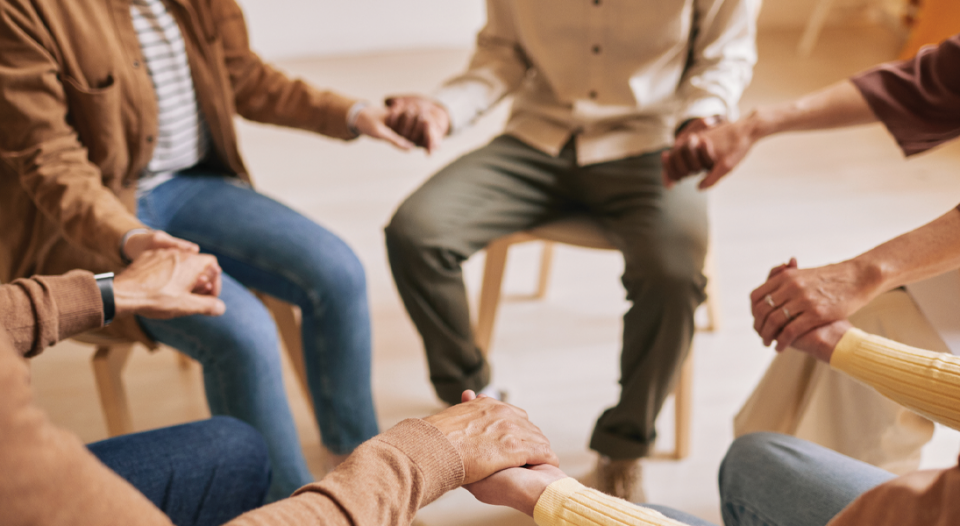This past year has been incredibly difficult for Sylvia Havlish. Shortly after the onset of the COVID-19 pandemic, her husband of 49 years died. On top of that unimaginable loss, she received a cancer diagnosis shortly thereafter.
Havlish—a decadeslong grief counselor who facilitates group sessions at Grace Lutheran Church in Macungie, Pa.—was arguably better equipped than most to handle such immense trauma. While she admits her coping skills helped, grieving both the loss of a loved one and a health crisis amid a pandemic felt exceptionally challenging.
“This happened to so many people. COVID put a whole new spin on grief because you’re so alone,” she said. “The aloneness—that part of grief is always difficult, and because of COVID and the lockdown, what a different spin it is. I was grieving and wasn’t able to take calls at that time. I knew I couldn’t do it until I was able to have some healing time.”
Havlish isn’t the only one who has struggled this past year. According to a July 2020 study published in the “Proceedings of the National Academy of Sciences USA,” each U.S. COVID-19 death leaves an estimated nine close relatives bereaved. And a March 2021 poll from the Associated Press–NORC Center for Public Affairs Research found that nearly 20% of people surveyed in the U.S. had lost a family member or close friend to COVID-19.
“No matter who we are, whether we have had a loved one die with COVID or not, you have experienced some kind of grief because your life has been totally turned upside down.”
But death isn’t the only source of grief during the pandemic. Isolation, job loss and missing out on milestone events like proms, graduations and weddings have left many feeling grief that they’re unsure of how to process.
“Grieving has taken on so many different hats through all of this,” said Pat Fesler, a grief support professional and pastoral assistant at Zion Lutheran Church in Youngstown, Ohio. “Because no matter who we are, whether we have had a loved one die with COVID or not, you have experienced some kind of grief because your life has been totally turned upside down.”
Amid this wide-reaching grief epidemic, ELCA congregations and organizations have stepped up to help parishioners and community members process and heal from pandemic loss. From group sessions at congregations to individual counseling through organizations such as Lutheran Services in Iowa, these resources aim to provide a sense of peace in a troubling time.
Finding peace and healing
Once she entered remission on her cancer diagnosis and felt comfortable enough to return to work after grieving her husband, Havlish said, resuming bereavement sessions at Grace helped her process her loss.
At Grace, she facilitates traditional bereavement sessions as well as something she calls the “Getting Unstuck Group.” This group is open to anyone feeling “stuck” in their lives, and it often serves as a transition for those completing the church’s six-week bereavement series.
“The Getting Unstuck Group was something I was doing for the last 25 years,” Havlish said. “Many of the people in my grief groups, especially widows, have been coming to my Getting Unstuck groups too. They learned they loved the feeling of belonging and having a soft place to fall.”
At Zion, Fesler leads several groups and special events, including grief support for those who’ve lost a child or spouse. She also facilitates a group for children and teens that faltered a bit during the height of the pandemic but has resumed since vaccines have made it safer to meet in person.
These support services not only help people process the impact of the pandemic in the short term but can also instill a lasting sense of peace and healing.
“I could do groups for adults virtually, but doing a kids and teens grief group virtually doesn’t work because they don’t like to talk in front of their parents,” she said. “When I brought them back together the first time, you would have thought I gave them a million dollars—they were so excited to be back together and able to talk to each other.”
Fesler also leads holiday services for those grieving called “A Break Through the Darkness.” Attending church, particularly during the holidays, can be difficult for those who are mired in grief. These services are designed to provide a safe space for the grieving to worship and process their feelings of loss. “People come and it’s like, ‘Oh my gosh, it makes me feel so good that I’m here at a service with people I can sit and cry with, and I don’t have to sit in church and be embarrassed to cry,’” she said.
Fesler also said it’s critical for congregations and organizations to provide grief support, if possible, particularly in the wake of the pandemic. She said these support services not only help people process the impact of the pandemic in the short term but can also instill a lasting sense of peace and healing.
“If we don’t provide that help, people are out there dangling and don’t know where to go and what to do,” she said. “And one of the things I say to people all the time is, ‘If you don’t deal with it now, some five, 10, 20 years down the road, it will come knocking at your door.’ You have to deal with it.”






